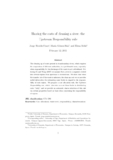Sharing the costs of cleaning a river: the Upstream Responsibility rule
Fecha
2015Versión
Acceso abierto / Sarbide irekia
Tipo
Artículo / Artikulua
Versión
Versión aceptada / Onetsi den bertsioa
Identificador del proyecto
Impacto
|
|
10.1016/j.geb.2015.02.008
Resumen
The cleaning up of waste present in transboundary rivers, which requires the cooperation of different authorities, is a problematic issue, especially when responsibility for the discharge of the waste is not well-defined. Following Ni and Wang (2007) we assume that a river is a segment divided into several regions from upstream to downstream. We show that when the transfer rate of the waste is un ...
[++]
The cleaning up of waste present in transboundary rivers, which requires the cooperation of different authorities, is a problematic issue, especially when responsibility for the discharge of the waste is not well-defined. Following Ni and Wang (2007) we assume that a river is a segment divided into several regions from upstream to downstream. We show that when the transfer rate of the waste is unknown, the clean-up cost vector provides useful information for estimating some limits in regard to the responsibility of each region. We propose a cost allocation rule, the Upstream Responsibility rule, which takes into account these limits in distributing costs “fairly” and we provide an axiomatic characterization of this rule via certain properties based on basic ideas concerning the responsibility of regions. [--]
Materias
Cost allocation,
Waste river,
Responsibility,
Characterization
Editor
Elsevier
Publicado en
Games and Economic Behavior 90 (2015) 134-150
Departamento
Universidad Pública de Navarra. Departamento de Economía /
Nafarroako Unibertsitate Publikoa. Ekonomia Saila
Versión del editor
Entidades Financiadoras
Jorge Alcalde-Unzu acknowledges the financial support from the Spanish Government through the project ECO2012–34202 and Fundación Ramón Areces. María Gómez-Rúa acknowledges the financial support from the Spanish Government through the project ECO2011-23460 and the Galician Government through the project 2013XGCEDU08072013EMER. Elena Molis acknowledges the financial support from the Spanish Government through the projects ECO2012–31346 and ECO2013–44879–R, from the Consejería de Economía, Innovación, Ciencia y Empleo, Junta de Andalucía through the projects SEJ–492 and SEJ–1436 and from the Basque Government through the project IT568–13.







